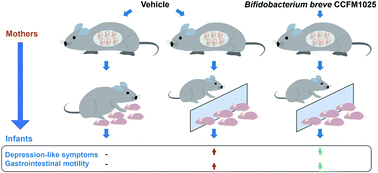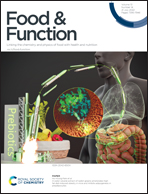Perinatal transmission of a probiotic Bifidobacterium strain protects against early life stress-induced mood and gastrointestinal motility disorders†
Abstract
Early life stress can considerably interfere in gut microbiome formation and nervous system development. Specific probiotic strains have been proved to exert anti-stress effects by modulating the gut–brain axis. However, little is known about whether probiotic treatment during pregnancy can protect the offspring from early life stress. In this study, Bifidobacterium breve CCFM1025, previously proven to exert microbial and neurobiological regulation effects, was given to pregnant mice. The offspring's gut and brain functions were evaluated when challenged with maternal separation. Intriguingly, treatment with probiotics during pregnancy protected the offspring from maternal separation-induced neurobiological and gastrointestinal disorders such as depression-like behaviour and delayed defecation. Quantification of CCFM1025 was performed, and perinatal transmission of CCFM1025 was further validated, which also explained the reason for increased levels of colonic 5-hydroxytryptamine and caecal short-chain fatty acids in the offspring. Our findings indicated that the effects of probiotics can be perinatally transmitted through gut microbes and that probiotic treatment during pregnancy may have great potential in managing health risks in early life.

- This article is part of the themed collection: Food & Function HOT Articles 2022


 Please wait while we load your content...
Please wait while we load your content...